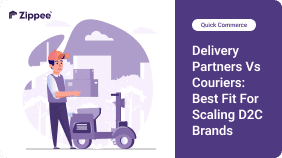
Delivery partners vs Couriers: Which is better for dcaling D2C brands? :
We all have ideas. And more than ever, those ideas are becoming ecommerce brands, from nutrition startups to personal care labels to regional snacks. But once the orders start rolling in, there's one question every founder needs to solve:
“How do I deliver — fast, reliably, and at scale?”
Consumer expectations have changed. “5–7 day delivery” won’t cut it anymore. To stay competitive, today’s brands need more than just shipping; they need complete ecommerce shipping solutions that combine speed, visibility, and control.
The Ecommerce Speed Shift: From 5 Days to 60 Minutes
In India’s metro cities, instant and 60-minute or 120-minute delivery has become a real demand driver. What started with groceries is now reshaping ecommerce as a whole.
Over 72% of Indian online shoppers say quick delivery is their top priority, more than price or product range. (RedSeer, 2024)
Shoppers expect products to show up the same day they order. And they expect updates every step of the way. That’s where traditional ecommerce shipping models fall short. Emerging brands need partners that offer ultra-fast SLAs, dark store support, and real-time tracking.
Why Quick Commerce Is No Longer Just for Groceries
What Blinkit and Zepto pioneered in perishables is now becoming the norm across categories.
Example: In 2025, Blue Tokai and Tira began offering 120-minute delivery on selected SKUs in top metro zones, seeing a 25–40% conversion boost.
Quick commerce is now a key differentiator in the broader ecommerce ecosystem, especially for products with high-repeat potential like skincare, coffee, snacks, and wellness. If you’re not offering 60-minute or 120-minute delivery, you’re not meeting urban customer expectations.
But delivering at that speed isn’t feasible with courier networks alone — it requires a structured b2b platform for delivery that offers tech-backed infrastructure.
Ecommerce Shipping Solutions That Go Beyond Couriers
Most brands start out using standard courier integrations, but growth exposes their limits fast.
Problem: High RTOs, poor tracking, missed SLAs, no brand control.
Modern ecommerce shipping solutions need to combine flexibility (standard + express), automation (real-time syncing), and insights (RTO% tracking, SLA adherence). That’s why growing D2C brands are moving toward hybrid models, where quick commerce handles high-demand products and ecommerce shipping covers the rest.
Platforms like Zippee offer both, with dark store infrastructure and full-stack integrations built for scale.
What a B2B Platform for Delivery Should Actually Offer
Not all b2b delivery platforms are created equal. Look for partners who provide:
- 50+ dark stores across key metros
- Same-day and 60-minute/120-minute delivery options
- Real-time order sync with Shopify and WooCommerce
- SLA visibility + reduction in RTOs
- Customer notifications via WhatsApp/SMS
Related: Top Quick Commerce Logistics Partners for D2C Brands
Zippee isn’t just a shipping service; it’s a b2b platform for delivery built for scaling consumer brands.
Is It Time to Upgrade Your Ecommerce Shipping Stack?
You’ve built product-market fit. You’re growing in Tier 1 and Tier 2 cities. But your current shipping partner is holding you back. That’s when it’s time to rethink your delivery stack.
Ask yourself:
- Are you fulfilling 50+ orders a day?
- Are most of your customers in urban, digitally active markets?
- Are you seeing abandoned carts due to long delivery timelines?
- Is RTO eating into your margins?
If yes, it’s time to move from “shipping” to real ecommerce shipping solutions.
Explore: Ecommerce vs Quick Commerce - What’s the difference?
Conclusion
Today’s consumers don’t just buy a product; they buy the delivery promise that comes with it. To compete in modern ecommerce, speed, control, and visibility aren’t “nice-to-haves”; they’re the baseline. Zippee helps consumer brands deliver faster through a scalable, tech-enabled b2b platform for delivery. Whether you’re adding same-day shipping or launching quick commerce for top SKUs, we help you turn delivery into a growth lever.





.png&w=256&q=75)













